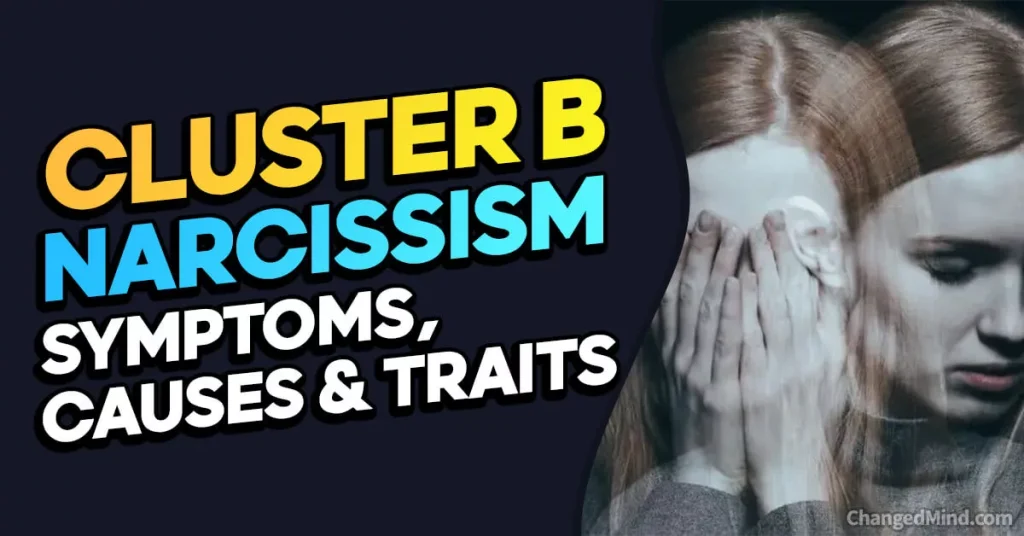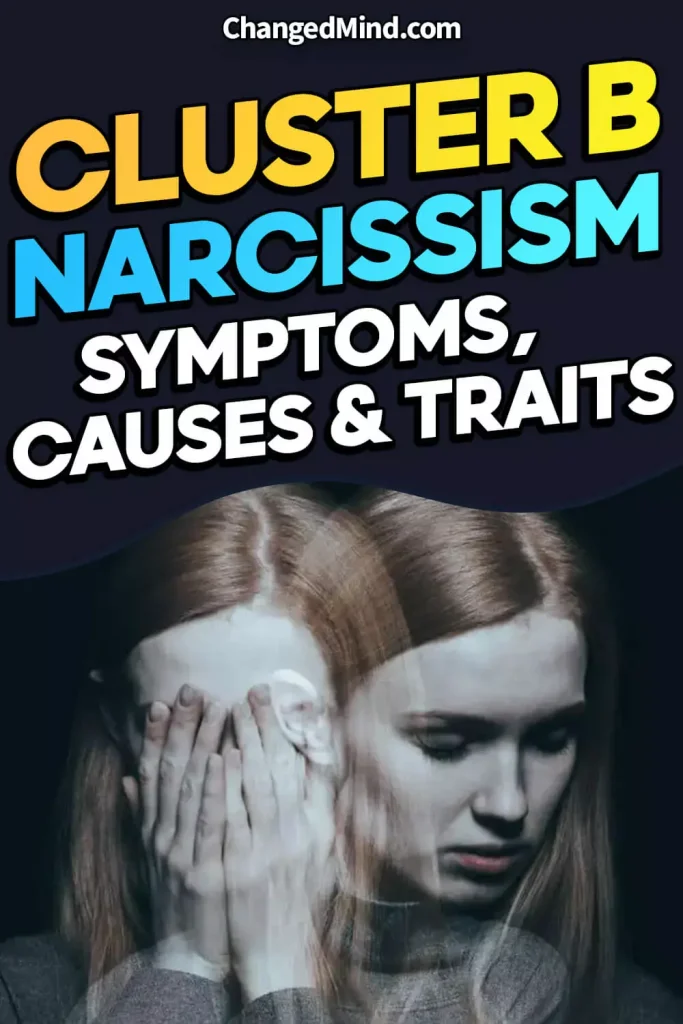Hey there, curious minds! Have you ever encountered someone who thinks the world revolves around them?
We’ve all crossed paths with the occasional self-absorbed individual, but what happens when that self-centeredness reaches a whole new level? Buckle up, because today we’re diving into the captivating world of Cluster B Narcissism.
In this article, we’ll uncover the definition, causes, and 20 telltale symptoms and traits of this fascinating personality disorder. Get ready to explore the intricate web of grandiosity, manipulation, and those infamous “me, myself, and I” moments.
So, grab your detective hat and join us as we unravel the secrets of Cluster B Narcissism!
Short Answer: Cluster B Narcissism is a personality disorder characterized by traits such as grandiosity, lack of empathy, manipulative behavior, and an insatiable need for admiration and validation.
In this article, we’ll cover:
- The definition of Cluster B Narcissism and its subtypes
- 20 symptoms and traits to watch out for
- Possible causes and contributing factors
- How to recognize narcissistic behavior in others
- The impact of Cluster B Narcissism on relationships and emotional well-being
Let’s embark on this enlightening journey and unveil the captivating world of Cluster B Narcissism together!
What Is Cluster B Narcissism?
Cluster B Narcissism refers to a set of personality disorders characterized by a pervasive pattern of grandiosity, a constant need for admiration, and a lack of empathy for others. This cluster encompasses several specific disorders, including Narcissistic Personality Disorder (NPD), Borderline Personality Disorder (BPD), Histrionic Personality Disorder (HPD), and Antisocial Personality Disorder (APD).

Importance of Understanding Cluster B Narcissism
Recognizing and comprehending Cluster B Narcissism is of paramount importance in both personal and professional spheres. By familiarizing ourselves with the traits and behaviors associated with this disorder, we empower ourselves to navigate relationships, set boundaries, and protect our emotional well-being. Understanding Cluster B Narcissism equips us with the knowledge and tools necessary to interact with these individuals more effectively and mitigate potential harm.
Now that we have laid the foundation, let’s explore the intricate world of Cluster B Narcissism further. In the following sections, we will delve into the characteristics, traits, and impact of Cluster B Personality Disorders, with a particular focus on Narcissistic Personality Disorder (NPD). Get ready to uncover the fascinating intricacies of these complex individuals and how their behaviors can shape our experiences.
Understanding Cluster B Personality Disorders
Now that we have a grasp on the concept of Cluster B Narcissism, let’s dive deeper into the world of Cluster B Personality Disorders as a whole. By gaining a broader understanding of these disorders, we can better appreciate the nuances and complexities that shape the behaviors of individuals within this cluster.
Overview of Cluster B Personality Disorders
Cluster B Personality Disorders encompass four distinct disorders: Narcissistic Personality Disorder (NPD), Borderline Personality Disorder (BPD), Histrionic Personality Disorder (HPD), and Antisocial Personality Disorder (APD). While each disorder has unique characteristics, they share underlying similarities that define the cluster.
Key Features and Common Characteristics
Although Cluster B Personality Disorders differ in their specific traits, they do share several key features and common characteristics. These include:
- Emotional Instability: Individuals within Cluster B often exhibit intense and unpredictable emotional states, which can manifest as frequent mood swings and impulsive behaviors.
- Difficulty with Interpersonal Relationships: Establishing and maintaining healthy relationships can be challenging for those with Cluster B disorders. Their behaviors, such as manipulation and a lack of empathy, can strain connections with others.
- Sense of Entitlement: Cluster B individuals may possess an inflated sense of self-importance and a belief that they deserve special treatment and recognition.
- Impulsivity and Risky Behavior: The impulsive nature of individuals within this cluster can lead to engaging in reckless actions, such as substance abuse, excessive spending, or dangerous activities.
Differentiating between Cluster B Disorders
While the disorders within Cluster B share certain characteristics, it is essential to distinguish between them for accurate understanding and identification. Here’s a brief overview of the primary distinctions:
- Narcissistic Personality Disorder (NPD): NPD is characterized by an excessive need for admiration, a grandiose sense of self-importance, and a lack of empathy for others.
- Borderline Personality Disorder (BPD): BPD is marked by intense emotional instability, difficulties with self-identity, impulsive behavior, and a fear of abandonment.
- Histrionic Personality Disorder (HPD): Individuals with HPD seek constant attention, exhibit exaggerated emotions, and may engage in attention-seeking behaviors.
- Antisocial Personality Disorder (APD): APD is characterized by a disregard for the rights of others, a lack of empathy or remorse, and a tendency toward manipulative and deceitful behavior.
Understanding the distinctions between these disorders provides valuable insight into the multifaceted nature of Cluster B Personality Disorders. Now that we have explored the overview and key features of these disorders, we can move forward to explore Narcissistic Personality Disorder (NPD) in more detail. Buckle up, as we delve into the intricate realm of NPD in the next section!
20 Symptoms of Cluster B Narcissism
Are you ready to take a deep dive into the intriguing world of Cluster B Narcissism? Buckle up, because we’re about to unleash a list of 20 symptoms that can help you identify those self-absorbed superheroes in your life. Keep in mind that these symptoms may vary in intensity and presentation, but they serve as red flags to watch out for. Let’s jump right in and explore the colorful spectrum of Cluster B Narcissism:
- Grandiosity: They have an inflated sense of self-importance and believe they are superior to others.
- Lack of Empathy: They struggle to understand or care about the feelings and needs of others.
- Entitlement: They believe they deserve special treatment and privileges without considering others.
- Constant Need for Admiration: They crave excessive praise, attention, and validation from others.
- Sense of Superiority: They have an exaggerated sense of their own abilities and achievements.
- Exploitative Behavior: They take advantage of others for personal gain without guilt or remorse.
- Manipulation: They are skilled at manipulating and influencing others to serve their own interests.
- Shallow Relationships: They struggle to form deep, meaningful connections and prioritize surface-level interactions.
- Envious Nature: They feel envy towards others’ success and may try to undermine or belittle them.
- Arrogance: They display an attitude of superiority and may belittle or demean those they consider inferior.
- Boundary Violations: They disregard and disrespect personal boundaries, invading others’ personal space or privacy.
- Fragile Self-Esteem: They have a fragile and vulnerable self-esteem that can be easily threatened.
- Attention-Seeking Behavior: They go to great lengths to seek attention and admiration, even at the expense of others.
- Explosive Anger: They may display intense anger or aggression when their sense of superiority is challenged.
- Difficulty Accepting Criticism: They have a hard time accepting feedback or criticism and may react defensively or dismissively.
- Charm and Charisma: They can be charismatic and charming, drawing others in with their magnetic personality.
- Fantasies of Power and Success: They have grandiose fantasies of unlimited success, power, beauty, or brilliance.
- Lack of Accountability: They often avoid taking responsibility for their actions and deflect blame onto others.
- Superficial Appearance: They prioritize their physical appearance and may engage in excessive grooming or vanity.
- Emotional Manipulation: They use emotional manipulation techniques such as guilt-tripping, gaslighting, or playing the victim.
Remember, encountering some of these symptoms doesn’t automatically mean someone has Cluster B Narcissism. It’s important to consider the overall pattern of behavior and seek professional guidance for an accurate diagnosis.
Examining Narcissistic Personality Disorder (NPD)
Now, let’s dive into the specific details of Narcissistic Personality Disorder (NPD), one of the key disorders within the Cluster B category. Understanding NPD will provide us with invaluable insights into the mindset and behaviors of those who exhibit narcissistic traits.
Definition and Diagnostic Criteria
Narcissistic Personality Disorder (NPD) is a mental health condition characterized by a pervasive pattern of grandiosity, an insatiable need for admiration, and a lack of empathy for others. To be diagnosed with NPD, an individual must exhibit specific criteria outlined in the Diagnostic and Statistical Manual of Mental Disorders (DSM-5).
These diagnostic criteria typically include:
- Grandiose Sense of Self-Importance: Individuals with NPD often have an exaggerated sense of their own importance and achievements. They believe they are unique and deserving of special treatment.
- Fantasies of Unlimited Success, Power, and Beauty: NPD individuals frequently harbor grandiose fantasies of limitless success, power, brilliance, or beauty.
- Need for Excessive Admiration: They have an insatiable need for constant admiration, seeking validation and praise from others to bolster their fragile self-esteem.
- Lack of Empathy: A hallmark trait of NPD is a marked lack of empathy and an inability to recognize or understand the emotions and needs of others.
- Sense of Entitlement: Those with NPD often have an unreasonable sense of entitlement, expecting others to meet their demands and fulfill their desires.
- Exploitative Behavior: They may exploit or take advantage of others to achieve their own goals, often without guilt or remorse.
Identifying Signs and Symptoms of NPD
Identifying the signs and symptoms of Narcissistic Personality Disorder (NPD) can help you navigate interactions with individuals who exhibit narcissistic traits. While each person with NPD may display varying degrees of these characteristics, common signs include:
- Exaggerated Self-Importance: They may constantly boast about their accomplishments, talents, or possessions.
- Constant Need for Attention and Admiration: Individuals with NPD crave attention and will seek admiration from others incessantly.
- Lack of Empathy: They struggle to empathize with the feelings and experiences of others, often dismissing or belittling them.
- Manipulative Behavior: NPD individuals are skilled at manipulating others to fulfill their own needs and desires.
Impact on Interpersonal Relationships
Narcissistic Personality Disorder (NPD) can significantly impact interpersonal relationships. These individuals often struggle with maintaining healthy connections due to their self-centered behaviors and lack of empathy. The impact may include:
- Emotional Manipulation: NPD individuals are adept at manipulating others through tactics such as gaslighting, belittling, and guilt-tripping.
- Difficulty in Genuine Emotional Intimacy: Their emotional unavailability and self-centeredness hinder the establishment of deep, meaningful connections.
- Challenges in Setting Boundaries: NPD individuals often disregard or challenge personal boundaries, making it difficult to maintain a healthy relationship dynamic.
Understanding the definition, diagnostic criteria, signs, symptoms, and impact of Narcissistic Personality Disorder (NPD) equips you with the knowledge necessary to recognize and navigate interactions with individuals who exhibit narcissistic traits. In the next section, we will explore the specific traits commonly associated with Cluster B Narcissists, shedding light on their manipulative behavior and the red flags to watch out for.
Exploring Cluster B Narcissistic Traits
In this section, we will dive into the specific traits commonly associated with Cluster B Narcissists. By understanding these traits, you’ll be better equipped to recognize their manipulative behavior and identify the red flags that may arise in your interactions. Let’s explore the fascinating and sometimes bewildering characteristics exhibited by individuals within this cluster.
Manipulative Behavior and Grandiosity
One of the defining traits of Cluster B Narcissists is their manipulative behavior and grandiose sense of self. They possess a knack for manipulating others to serve their own desires and maintain their inflated self-image. Here’s what you need to know:
- Manipulation Techniques: Cluster B Narcissists are adept at employing various manipulation techniques to control and influence those around them. Some common tactics include gaslighting, triangulation, and emotional blackmail.
- Grandiosity: These individuals have an exaggerated sense of their own importance and achievements. They often believe they are superior to others and deserve special treatment and admiration.
Example: Imagine a colleague who constantly boasts about their accomplishments, exaggerates their contributions, and expects everyone to acknowledge their greatness. They may manipulate situations to make themselves the center of attention or exploit others to further their own interests.
Lack of Empathy and Entitlement
Another prominent trait of Cluster B Narcissists is their profound lack of empathy and an overwhelming sense of entitlement. These characteristics can significantly impact their relationships and interactions with others. Here’s what you should be aware of:
- Lack of Empathy: Cluster B Narcissists struggle to understand or empathize with the emotions and experiences of others. They often dismiss or belittle the feelings and needs of those around them.
- Sense of Entitlement: Due to their inflated self-image, Cluster B Narcissists harbor an unreasonable sense of entitlement. They believe they deserve special treatment, attention, and recognition, regardless of the impact on others.
Example: Picture a friend who consistently disregards your feelings, dismisses your concerns, and only focuses on their own needs. They may expect you to prioritize their desires without reciprocating or considering how their actions affect you.
Emotional Instability and Impulsivity
Emotional instability and impulsivity are common traits observed in Cluster B Narcissists. Their erratic emotional states and impulsive actions can create a chaotic environment in both personal and professional relationships. Here’s what you might encounter:
- Emotional Rollercoaster: Cluster B Narcissists often experience intense emotional fluctuations, which can result in unpredictable mood swings, outbursts of anger, or moments of extreme sadness.
- Impulsive Behavior: These individuals frequently engage in impulsive actions without considering the consequences. They may make rash decisions, spend money recklessly, or pursue short-term gratification.
Example: Consider a partner who alternates between showering you with affection and love one moment and then erupting into fits of rage or withdrawing emotionally the next. Their impulsive behavior might involve making impetuous financial decisions that impact your shared stability.
Understanding the manipulative behavior, grandiosity, lack of empathy, entitlement, emotional instability, and impulsivity commonly exhibited by Cluster B Narcissists is vital in navigating relationships and safeguarding your well-being. In the next section, we will delve into the red flags and warning signs that can help you identify these individuals early on. Stay tuned!
Recognizing Cluster B Narcissists in Your Life
In this section, we’ll explore how to recognize the presence of Cluster B Narcissists in your life. By being aware of the red flags and warning signs, as well as the common manipulation tactics they employ, you can navigate these relationships more effectively. Let’s dive in!
Identifying Red Flags and Warning Signs
Recognizing the red flags and warning signs of Cluster B Narcissists can help you identify these individuals early on and take necessary precautions. Keep an eye out for the following indicators:
- Excessive Self-Centeredness: Cluster B Narcissists consistently prioritize their own needs and desires, often neglecting or dismissing the needs of others.
- Constant Need for Admiration: They crave excessive attention and admiration, seeking validation from others to boost their fragile self-esteem.
- Lack of Empathy: Cluster B Narcissists struggle to understand or relate to the emotions and experiences of others, displaying a lack of genuine empathy.
- Sense of Entitlement: These individuals believe they are entitled to special treatment, recognition, and privileges, often disregarding the impact on others.
- Emotional Manipulation: Cluster B Narcissists employ various manipulative tactics such as gaslighting, triangulation, and emotional blackmail to control and influence those around them.
Common Tactics and Manipulation Techniques
Cluster B Narcissists often employ specific manipulation techniques to maintain control and power in their relationships. Understanding these tactics can help you navigate interactions with these individuals more effectively. Look out for:
- Gaslighting: Manipulating someone’s perception of reality to make them doubt their own sanity or judgment.
- Triangulation: Creating conflict or competition between individuals to assert control and maintain power.
- Emotional Blackmail: Using guilt, fear, or other emotional tactics to manipulate and gain compliance from others.
Examples and Case Studies
To further illustrate the behaviors and impact of Cluster B Narcissists, let’s explore a few examples and case studies:
- Example 1: The Workplace Narcissist: Imagine a coworker who consistently takes credit for others’ ideas, belittles colleagues’ contributions, and manipulates situations to maintain a position of power. They thrive on the admiration and recognition they receive, often at the expense of their coworkers’ well-being.
- Example 2: The Toxic Friend: Picture a friend who constantly seeks attention, disregards your feelings, and manipulates you to fulfill their own needs. They may engage in backhanded compliments or play mind games to assert their dominance in the friendship, leaving you feeling emotionally drained and undervalued.
By recognizing these examples and case studies, you can gain a deeper understanding of the behaviors exhibited by Cluster B Narcissists and how they impact the lives of those around them. In the next section, we will discuss coping strategies and provide practical advice on dealing with narcissists, setting boundaries, and nurturing your emotional resilience. Stay tuned!
Coping Strategies and Dealing with Cluster B Narcissists
Dealing with Cluster B Narcissists can be challenging, but there are strategies you can employ to protect yourself and maintain your emotional well-being. In this section, we will explore coping strategies and provide practical advice on how to navigate interactions with narcissistic individuals.
Setting Boundaries and Asserting Yourself
Setting clear and firm boundaries is essential when dealing with Cluster B Narcissists. Here are some tips to help you establish and maintain healthy boundaries:
- Identify Your Boundaries: Reflect on your values, needs, and limits. Determine what you are comfortable with and where you draw the line.
- Communicate Clearly: Clearly and assertively express your boundaries to the narcissist. Use “I” statements to convey your needs and expectations.
- Enforce Consequences: Establish consequences for boundary violations and follow through on them. This reinforces the importance of respecting your boundaries.
- Practice Self-Care: Engage in self-care activities that nurture your well-being and provide a respite from narcissistic interactions.
Developing Emotional Resilience
Building emotional resilience is crucial when dealing with Cluster B Narcissists. Here are some strategies to enhance your emotional well-being:
- Self-Reflection: Reflect on your own values, strengths, and self-worth. This will help you maintain a strong sense of self amidst manipulative tactics.
- Practice Empathy for Yourself: Extend the same compassion and understanding to yourself that you would offer to others. Recognize that your emotions and needs are valid.
- Manage Your Reactions: Stay mindful of your emotions and reactions when dealing with narcissistic behavior. Practice techniques like deep breathing and grounding exercises to stay centered.
- Seek Support: Lean on trusted friends, family, or support groups who can provide validation, guidance, and a safe space to share your experiences.
Seeking Support and Professional Help
Navigating relationships with Cluster B Narcissists can be emotionally taxing. Seeking support from professionals can be immensely helpful. Consider the following options:
- Therapy or Counseling: Engage in therapy to gain insight, develop coping strategies, and heal from any emotional wounds caused by narcissistic relationships.
- Support Groups: Joining support groups, either online or in-person, can connect you with individuals who have had similar experiences and provide a supportive community.
- Educational Resources: Seek out reputable books, articles, and websites that offer guidance on understanding and dealing with narcissistic individuals.
Remember, coping with Cluster B Narcissists requires resilience, self-care, and a support network. By setting boundaries, developing emotional resilience, and seeking professional help, you can navigate these challenging relationships while safeguarding your well-being.
Expert Says
Laurie Hollman, PhD
Licensed Psychoanalyst, Choosing Therapy | Author, “Are You Living with a Narcissist?”.

In the next section, we will explore the process of healing and recovery, providing practical advice and support for survivors of narcissistic abuse. Get ready to embark on a journey of healing and rebuilding.
Healing and Recovery
Congratulations on reaching the stage of healing and recovery! Moving forward from narcissistic relationships requires self-care, rebuilding self-esteem, and breaking free from the emotional chains that may still linger. In this section, we will explore practices and strategies to support your healing journey.
Self-Care Practices for Survivors
Self-care is vital for survivors of narcissistic abuse. Here are some practices to prioritize your well-being:
- Set Healthy Boundaries: Continue to enforce boundaries to protect yourself from toxic individuals and situations that may trigger negative emotions.
- Practice Self-Compassion: Be kind to yourself and acknowledge the pain you’ve endured. Treat yourself with the same empathy and understanding you would offer a dear friend.
- Engage in Activities You Enjoy: Rediscover your passions and engage in activities that bring you joy and fulfillment. This helps in reclaiming your identity and rebuilding a sense of self.
- Seek Solitude: Take time for solitude and reflection. Use this quiet space to process your emotions, gain clarity, and reconnect with your inner self.
Rebuilding Self-Esteem and Self-Worth
Rebuilding self-esteem and self-worth after narcissistic abuse may take time, but it is possible. Consider the following strategies:
- Challenge Negative Self-Talk: Replace self-critical thoughts with positive affirmations. Remind yourself of your strengths, accomplishments, and inherent worthiness.
- Practice Self-Validation: Trust your own perceptions and feelings. Validate your experiences and embrace your emotions without self-doubt.
- Focus on Personal Growth: Engage in personal development activities such as learning new skills, pursuing hobbies, or attending workshops that empower you and foster personal growth.
- Surround Yourself with Positive Influences: Seek out supportive and nurturing relationships with friends, family, or support groups who uplift and validate your experiences.
Moving Forward and Breaking Free
Moving forward and breaking free from the residual effects of narcissistic abuse requires courage and determination. Consider the following steps:
- Practice No Contact: Sever ties with the narcissistic individual, if possible. Maintain strict boundaries and avoid contact to protect yourself from further manipulation and toxicity.
- Focus on Your Future: Shift your focus towards building the life you desire. Set goals, pursue new opportunities, and create a vision for your future that aligns with your authentic self.
- Embrace Forgiveness and Letting Go: Forgiving the narcissist is not about condoning their behavior but freeing yourself from the burden of resentment and anger. Letting go allows space for healing and growth.
- Seek Professional Help if Needed: If you find it challenging to heal on your own, consider seeking support from therapists or counselors who specialize in narcissistic abuse recovery.
Remember, healing is a unique journey, and it takes time. Be patient with yourself and celebrate the progress you make along the way. You deserve to rebuild your life, embrace your true worth, and move forward with a renewed sense of empowerment.
In the final section, we will conclude our exploration of Cluster B Narcissism and recap the key insights gained throughout this article. Let’s wrap it up and reflect on the valuable knowledge you have acquired!
Conclusion
Congratulations on completing this comprehensive guide on understanding and dealing with Cluster B Narcissism. Let’s recap the key points we’ve covered, offer encouragement to seek knowledge and support, and provide final thoughts on this important topic.
Recap of Key Points
Throughout this article, we have explored the intricate world of Cluster B Narcissism and Narcissistic Personality Disorder (NPD). Here are the key takeaways:
- Cluster B Narcissism refers to a cluster of personality disorders characterized by traits such as manipulative behavior, lack of empathy, grandiosity, and emotional instability.
- Narcissistic Personality Disorder (NPD) is a specific personality disorder within the cluster that involves a pervasive pattern of grandiosity, a constant need for admiration, and a lack of empathy.
- Identifying red flags and warning signs is crucial in recognizing narcissistic individuals early on. Pay attention to excessive self-centeredness, a constant need for admiration, lack of empathy, and manipulative behaviors.
- Coping with Cluster B Narcissists involves setting boundaries, developing emotional resilience, seeking support, and, if necessary, professional help.
- Self-care practices, rebuilding self-esteem, and breaking free from toxic relationships are essential components of healing and recovery.
Encouragement to Seek Knowledge and Support
Understanding Cluster B Narcissism and its impact is the first step in protecting yourself and navigating relationships with narcissistic individuals. Remember, you are not alone. Seek knowledge, empower yourself, and reach out for support. You deserve to live a fulfilling and healthy life.
If you have experienced narcissistic abuse or are currently in a toxic relationship, know that there are resources available to help you heal and rebuild. Reach out to therapists, support groups, or helplines specializing in narcissistic abuse. Surround yourself with a supportive community that can provide validation, guidance, and encouragement.
Final Thoughts on Understanding and Dealing with Cluster B Narcissism
Understanding Cluster B Narcissism empowers you to protect yourself, set boundaries, and foster healthy relationships. Remember, it’s not your responsibility to change or fix narcissistic individuals. Your well-being and self-worth should always come first.
By recognizing the red flags, employing coping strategies, and seeking support, you can break free from the grip of narcissistic abuse and move towards a brighter and more fulfilling future.
Continue to prioritize your emotional well-being, practice self-care, and nurture your resilience. Believe in your strength and worthiness. You have the power to create a life filled with healthy relationships and personal growth.
Remember, knowledge is power, and you now possess the tools to navigate the complex world of Cluster B Narcissism. Stay informed, seek support, and embrace your journey towards healing, rebuilding self-esteem, and reclaiming your life.
Wishing you strength, resilience, and a future filled with authentic connections and personal fulfillment.
Cluster B Narcissism FAQ
What are the different types of personality disorders in Cluster B?
Cluster B includes Narcissistic Personality Disorder (NPD), Borderline Personality Disorder (BPD), Histrionic Personality Disorder (HPD), and Antisocial Personality Disorder (ASPD).
What are some common traits of individuals with Cluster B Narcissism?
Common traits include grandiosity, lack of empathy, entitlement, manipulative behavior, emotional instability, impulsivity, and a constant need for admiration and validation.
How can I recognize a Cluster B Narcissist in my life?
Look out for red flags such as excessive self-centeredness, a constant need for admiration, lack of empathy, and manipulative tactics like gaslighting or emotional blackmail.
Can narcissistic behavior be treated or changed?
While personality disorders are difficult to treat, therapy and counseling can help individuals with Cluster B Narcissism develop self-awareness and healthier coping mechanisms.
What is the impact of Cluster B Narcissism on interpersonal relationships?
Cluster B Narcissism can lead to toxic and abusive relationships characterized by manipulation, emotional instability, and a disregard for the well-being of others.

Disclaimer
This information is for educational purposes only and is not intended to be a substitute for clinical care. Please consult a health care provider for guidance specific to your case.






